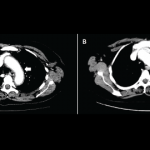The Rheumatology Perspective
Laura Cappelli, MD, MHS, MS, assistant professor of medicine, Division of Rheumatology, Johns Hopkins University School of Medicine, Baltimore, spent the remainder of the lecture discussing irAEs, providing clinical pearls for clinicians. Dr. Cappelli noted the spectrum of severity for irAEs runs from mild (i.e., dermatitis, thyroid dysfunction) to severe (i.e., myocarditis, myasthenia gravis, encephalitis).
She explained that irAEs may develop at different times in relation to starting the ICI medication; indeed, these events may occur soon after starting a medication or may not appear until months or years after initiating treatment, and irAEs have even occurred after the ICI treatment had been discontinued.8 In addition, most—but not all—autoimmune rheumatic diseases have been seen as a result of an irAE, such as inflammatory arthritis, sicca syndrome, myositis and vasculitis, although interestingly, systemic lupus erythematosus appears to be quite rare as an irAE. In one prospective observational study of 60 patients with inflammatory arthritis associated with use of ICIs, persistent arthritis was found to be associated with duration of ICI use, combination ICI therapy, and in patients with multiple other irAEs.9
Several organizations, including the American Society of Clinical Oncology (ASCO), the National Comprehensive Cancer Network (NCCN), the Society for Immunotherapy of Cancer (SITC) and the European Society for Medical Oncology (ESMO), have published guidelines on treatment principles with respect to irAEs.
In general, these guidelines advocate for treatment to be guided by the severity of the irAE. The Common Terminology Criteria for Adverse Events (CTCAE) grades irAEs from 1 through 5, with Grade 1 being mild and Grade 5 representing death.10 For a Grade 2 or higher irAE, corticosteroids are typically the first line of treatment. For a Grade 3 or higher irAE, the immune checkpoint inhibitor is typically held or discontinued, in addition to providing corticosteroid treatment. In cases of severe, persistent symptoms and complications of the irAE, in spite of corticosteroids and discontinuation of therapy, treatments that have been used include a range of conventional synthetic disease-modifying anti-rheumatic drugs (DMARDs) and biologic DMARDs.
Dr. Cappelli noted that much of the data on how to treat irAEs comes from case reports and small case series and that, in the future, it will be helpful to have more data on the responses to various treatments and the natural history of irAEs to better understand treatment strategies.
An important subject Dr. Cappelli touched on is tumor response related to immunosuppression for irAEs. After all, the indication for an ICI is treatment of a malignancy, and it is important to understand if treating an irAE with immunosuppression will make treatment of the cancer less effective. So far, data are mixed on this subject and mostly limited to short-term exposure to immunosuppression. In one study of nearly 300 patients, treatment with corticosteroids and short-term tumor necrosis factor inhibitor therapy did not affect melanoma therapy with ipilimumab.11 However, in a different study involving nearly 100 patients with melanoma who had ipilimumab-induced hypophysitis, those who received higher doses of glucocorticoids had reduced survival.12 These disparate findings indicate that much more needs to be understood regarding the balance of treating irAEs with the need to effectively treat the underlying malignancy.




